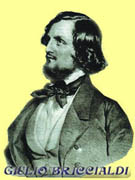
BRICCIALDI Guilio Born at Terni in Italy on the 2nd of March,1818. He was one of the finest flautists of the l9th century, being taught by his father who died in 1859. Briccialdi lived in great poverty, and with the equivalent of one and a half new pence in his pocket, tramped some forty miles to Rome. There he was rescued by a singer at the Sistine Chapel by the name of Ravagli, who placed the young Guilio with good teachers.At an early age, he won the Diploma of the St. Cecilia Academy in Rome and in 1836, aged only eighteen, went to Naples where he taught flute to the Count of Syracuse (the King`s brother). He adopted the Boehm flute in the early 1840`s and in 1845 developed his B flat thumb lever: the mechanism is still used on most flutes made today and is known as "Briccialdi`s B flat Thumbplate." His mechanism was first used on flutes made by Rudall and Rose from c 1849. He was appointed flute Professor at the Academy of St Cecilia in Rome and later held the same position at the Florence Conservatoire until his death on the 17th of December, 1881. His best known pupils were Bianchini and the Count of Syracuse. Briccialdi was considered a remarkably handsome man,and his playing was typical of the Ttalian School, possessing much elegance, yet powerful colouring. He was a masterful composer for his instrurnent, and some of the more important of his works are: threeconcerti, opp. 19, 61 and 65. duets for two flutes, opp. 36, 88, 100, 118 and 132, numerous fantasias, caprices. romances, many songs, exercises and studies for the flute.
La musica originale di Briccialdi: Romanza e polonese op.12 - Ballabile op.15 - Scherzo “Marceau da salon” op.16 - Sogno d’amore op.18 Il primo amore op.21 - Le Styrienne “Marceau da concert” op.29 -Notturno op.32 Il Lago delle Sirene “capriccio” op.38 - La Serenata op.41 - Divertimento op.44 -Marceau da concert op.61 - Andante e Polonaise op.62 - Marceau da salon “due fiori”op.63 -Capriccio op.64 Allegro alla spagnola op.69 - Cavatina senza parole op.70 Capriccio op.71(1852) -Solo romantico op.71(1853) - L’inglesina rondo brillante op.74 Pezzo per secena melodrammatica op.77 - Il Carnevale di Venezia op.78 Le Carezze op.79 - Solo brillante op.80 - Solo op.82 - Secondo notturno op.87 Mazurka op.88 - Le attuali amozioni d’italia op.103 Concertino alla moderna op.104 -Capriccio op.105 Il Vento op.112 - La Romanzesca op.113 - Andant et valse op.116 La primavera op.117 - Il Giardinetto di Perugia op.135 Danse op.138 - Lo spirito vacante op.139 - Trois Romances op.140
La musica originale di Briccialdi: Romanza e polonese op.12 - Ballabile op.15 - Scherzo “Marceau da salon” op.16 - Sogno d’amore op.18 Il primo amore op.21 - Le Styrienne “Marceau da concert” op.29 -Notturno op.32 Il Lago delle Sirene “capriccio” op.38 - La Serenata op.41 - Divertimento op.44 -Marceau da concert op.61 - Andante e Polonaise op.62 - Marceau da salon “due fiori”op.63 -Capriccio op.64 Allegro alla spagnola op.69 - Cavatina senza parole op.70 Capriccio op.71(1852) -Solo romantico op.71(1853) - L’inglesina rondo brillante op.74 Pezzo per secena melodrammatica op.77 - Il Carnevale di Venezia op.78 Le Carezze op.79 - Solo brillante op.80 - Solo op.82 - Secondo notturno op.87 Mazurka op.88 - Le attuali amozioni d’italia op.103 Concertino alla moderna op.104 -Capriccio op.105 Il Vento op.112 - La Romanzesca op.113 - Andant et valse op.116 La primavera op.117 - Il Giardinetto di Perugia op.135 Danse op.138 - Lo spirito vacante op.139 - Trois Romances op.140
il écoute, es hört